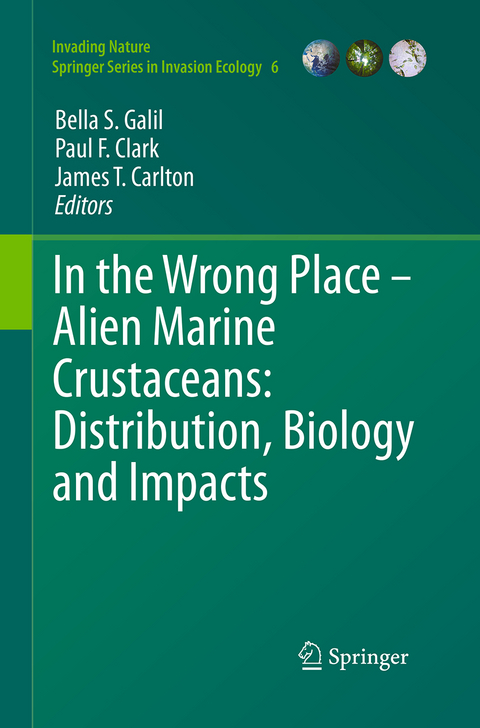
In the Wrong Place - Alien Marine Crustaceans: Distribution, Biology and Impacts
Springer (Verlag)
978-94-017-7766-7 (ISBN)
Part I In the Beginning
The Global Dispersal of Marine and Estuarine Crustaceans James T. Carlton Part II Global Dispersal.
Human-Mediated Spread of Alien Crabs Annette Brockerhoff and Colin McLay. The Global Spread of the Chinese Mitten Crab Eriocheir sinensis Matt G. Bentley. The Japanese Skeleton Shrimp Caprella mutica. (Crustacea, Amphipoda): A Global Invader of Coastal Waters. Karin Boos, Gail V. Ashton, and Elizabeth J. Cook Part III Alien Faunas by Region. Barnacle Invasions: Introduced, Cryptogenic, and Range Expanding. Cirripedia of North and South America James T. Carlton, William A. Newman, and Fábio Bettini Pitombo. Marine Crustacean Invasions in North America: A Synthesis of Historical Records and Documented Impacts Gregory Ruiz, Paul Fofonoff, Brian Steves, and Alisha Dahlstrom. Alien Decapod Crustaceans in the Southwestern Atlantic Ocean Marcos Tavares. The Alien and Cryptogenic Marine Crustaceans of South Africa Charles Griffi ths, Tamara Robinson, and Angela Mead. The Snow Crab, Chionoecetes Opilio (Decapoda, Majoidae,Oregoniidae) in the Barents Sea Ann-Lisbeth Agnalt, Valery Pavlov, Knut E. Jørstad,E. Farestveit, and Jan Sundet. Alien Malacostracan Crustaceans in the Eastern Baltic Sea:Pathways and Consequences Nadezhda A. Berezina, Victor V. Petryashev, Arturas Razinkovas, and Jūratė Lesutienė. Alien Crustaceans along the Southern and Western Baltic Sea Krzysztof Jażdżewski and Michał Grabowski. Checklist of Cryptogenic and Alien Crustacea of the European Atlantic Coast Pierre Y. Noël. The Alien Crustaceans in the Mediterranean Sea: An Historical Review Bella S. Galil. An Incoming Flood on a Cryptic Stage: Understanding Alien Crustacean Invasions in Southeast Asia Darren C.J. Yeo, James T. Carlton,Serena L.M. Teo, and Peter K.L. Ng. Alien Marine Crustaceans of Japan: A Preliminary Assessment Wataru Doi, Seiichi Watanabe, and James T. Carlton. Aliens in the Antipodes: Non-indigenous Marine Crustaceans of New Zealand and Australia Shane T. Ahyong and Serena L. Wilkens. Part IV Commercial Exploitation of Invasive DecapodsThe Pacifi c White Shrimp, Litopenaeus Vannamei, in Asia:The World’s Most Widely Cultured Alien Crustacean. I Chiu Liao and Yew-Hu ChienThe Invasive History, Impact and Management of the Red KingCrab Paralithodes camtschaticus off the Coast of NorwayLis Lindal Jørgensen and Einar M. Nilssen. The Commercial Exploitation of the Chinese Mitten Crab Eriocheir sinensis in the River Thames, London: Damned if We Don’t and Damned if We Do Paul F. Clark. Part V Case Studies. Live and Let Live: Invasive Host, Charybdis longicollis (Decapoda: Brachyura: Portunidae), and Invasive Parasite, Heterosaccus dollfusi (Cirripedia: Rhizocephala: Sacculinidae) Gianna Innocenti and Bella S. Galil. Invasion History and Success of the American Blue Crab Callinectes Sapidus in European and Adjacent Waters Stefan Nehring. The Introduced American Lobster, Homarus americanus in Scandinavian Waters Knut E. Jørstad, Ann-Lisbeth Agnalt, and Eva Farestveit. Part VI Carcinus in the Wrong Place The Evolutionary Ecology of European Green Crab,Carcinus maenas, in North America Timothy C. Edgell and Johan Hollander. More than One Way to Invade: Lessons from Genetic Studies of Carcinus Shore Crabs John A. Darling. Ecological Impacts of Replacing One Invasive Specieswith Another in Rocky Intertidal Areas Blaine D. Griffen.Index
| Erscheinungsdatum | 18.08.2022 |
|---|---|
| Reihe/Serie | Invading Nature - Springer Series in Invasion Ecology ; 6 |
| Zusatzinfo | XV, 716 p. |
| Verlagsort | Dordrecht |
| Sprache | englisch |
| Maße | 155 x 235 mm |
| Themenwelt | Naturwissenschaften ► Biologie ► Ökologie / Naturschutz |
| Naturwissenschaften ► Geowissenschaften ► Hydrologie / Ozeanografie | |
| Schlagworte | crustacea • Environmental impact • Marine Bioinvasions |
| ISBN-10 | 94-017-7766-7 / 9401777667 |
| ISBN-13 | 978-94-017-7766-7 / 9789401777667 |
| Zustand | Neuware |
| Haben Sie eine Frage zum Produkt? |
aus dem Bereich


